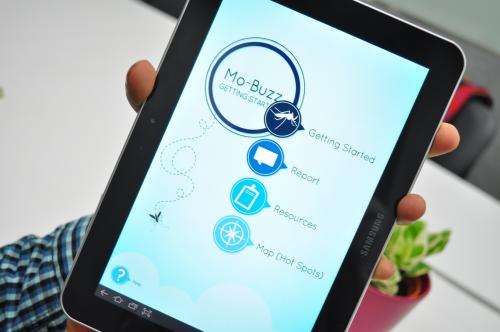System taps on crowdsourcing for real-time dengue monitoring

When it comes to stopping dengue, social media posts, tweets and a web system may be just what the doctor ordered.
Researchers at Nanyang Technological University (NTU) have developed a social media-based system called Mo-Buzz that can predict where and when dengue might occur.
It combines a web system that taps into historical data on weather and dengue incidents and swift reports by the public on mosquito bites and breeding sites via smart phones and tablets.
These reports are geo-tagged to the user's location and shown live on Google Maps in the system.
These real-time information can boost the authorities' efforts to keep a constant eye on the spread of dengue and, more importantly, help in using resources more accurately and in a more targeted manner.
The system is developed by NTU at the Centre of Social Media Innovations for Communities (COSMIC), which, as its name suggests, aims to develop social media innovations to bring about self help in a more integrated society.
Mo-Buzz is a combination of a public health surveillance web application, integrated with a social media-based mobile app. By leveraging crowdsourcing and advanced computing, Mo-Buzz can potentially predict dengue outbreaks weeks in advance, and enable users to help health authorities monitor the spread of dengue in real-time using their mobile devices.
"This new capability represents a significant shift in how the spread of dengue and other infectious diseases can and will be monitored in the future," said Associate Professor May O. Lwin, the principal investigator of the programme.
"What we're hoping to do with a dynamic system like Mo-Buzz is to create active channels of communication between citizens and health authorities during the dengue season. The main advantage is that it helps everyone take preventive action well ahead of time, which is what is important for preventing dengue and saving lives."
Health alerts and advice tailored to locations and users
Unlike conventional public health reporting, the system automatically processes historic weather and dengue incidence data using a computer simulation to generate predictive hotspot maps that forewarn the public and health authorities where and when dengue might occur. As soon as an area on the map is identified as a hotspot, health alerts and education messages can be quickly sent to residents in that area.
Users can also receive customised health information that they can share with their family and friends using social networking tools, such as Facebook, Twitter and even SMS. This encourages the community to adopt behaviours that will reduce their risk of contracting dengue.
The World Health Organisation (WHO) has invited COSMIC to implement the system in Monaragala, a rural district that is part of the WHO's global network of age friendly cities and communities.
"Our system will vastly reduce the time lag between collecting and reporting data and preventive action taken by the authorities. The app is quick and easy to use for health workers who are constantly on the move and performing multiple duties; it is simply a click of a button, rather than pages of paper work. They can also provide health education in a visually engaging format. Moving forward, we see this as an essential tool that can also be used in Singapore, Malaysia and other countries in the region," said Associate Professor Lwin, who specialises in research in public health communication.
Professor Schubert Foo, Director of the NTU COSMIC, comments, "Dengue is a problem in the region and Mo-Buzz provides a platform the community to fight dengue together with the authorities. As researchers, adoption of the system in different communities where dengue problems are severe will also enable us to better understand the necessary conditions for a successful public dengue health campaign and management system."













